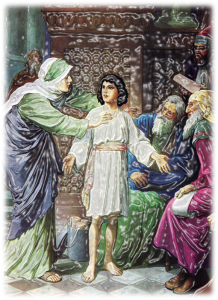LUKE 2: REVERSE ENGINEER A 3D PUZZLE
If putting a jigsaw puzzle on my Christmas “wish list” is out of the question, I’ve found it fascinating to reverse engineer the Creator God’s 3D global puzzle. For example, there’s so much in this chapter again today such that it is virtually impossible to focus on just one breadcrumb with you! This is mostly because our Maker is infinitely complex. HIStory, therefore, is a complex multifaceted masterpiece of working-wonders. In addition, His Global MasterPlan is specifically designed for providing a universal future and hope for ALL those created in His own image to live and operate like Him – just as the ancient Hebrew prophets Isaiah and Jeremiah had predicted[a] 700+/- years before Luke in today’s chapter.
So then, the first puzzle piece that I pull from the matrix to take a closer look at this morning, is the one with the clear references to dates. [v1-4] This is no ordinary “board game”. The backdrop painted here is not part of a fairytale. Luke was an educated non-Jewish doctor who was writing a report for a thoroughly educated Roman governor.[b] Even if this undertaking was voluntary, any attempt at deceiving a Roman official would have been severely dealt with, and Romans were well-known for their barbarous punishments! Although the Book of Luke is clearly a private document between two people, if Luke’s report had been found willfully misleading, it could have cost him his life – especially if he was not himself a Roman citizen.[c] With the information in Luke’s book easy to verify, the Creator God’s story in today’s chapter rests firmly in history – HIStory is our history.
If you have been following my Breadcrumbs throughout this year, you will know that I have covered parts of every book in the ‘library’ of what is now known as the Hebrew Old Testament – and this from The Beginning of the world until 400BC+/-. As HIStory now unfolds at the beginning of Part Two in the world’s longest running drama, Luke steps out onto center  stage to introduce the characters after a 400-year Intermission. Mary – related to Elizabeth a descendant of Aaron[d] – was from Israel’s Priestly Line. This is like saying that she’s a direct descendant of the very first Pope – if Popes were allowed to have children. Likewise, Joseph was from the House of David – Israel’s Royal Line. [v4] By pointing this out in his report, Luke clips these two puzzle pieces securely to the prophet Isaiah’s prediction in Part One of the Creator God’s Epic Play seven centuries earlier…
stage to introduce the characters after a 400-year Intermission. Mary – related to Elizabeth a descendant of Aaron[d] – was from Israel’s Priestly Line. This is like saying that she’s a direct descendant of the very first Pope – if Popes were allowed to have children. Likewise, Joseph was from the House of David – Israel’s Royal Line. [v4] By pointing this out in his report, Luke clips these two puzzle pieces securely to the prophet Isaiah’s prediction in Part One of the Creator God’s Epic Play seven centuries earlier…
“Hear you now, O Bais Dovid (House of David – Jews of Judah); Is it a small thing for you to weary anashim (humankind), but will you weary my God also? Therefore Hashem (The Name) Himself shall give you an ot (sign); Hinei (Look here!), HaAlmah (the unmarried young virgin) shall conceive and bear Ben (a child), and shall call Shmo (His Name) Immanu El (God is with us).” [Isaiah 7:13-14]
 A Roman politician isn’t likely to believe in something branded as “Jewish myths”. But, if he’s to keep everyone in check as a leader over a multi-cultural multi-faith melting-pot, he would have been thoroughly versed in the thinking behind the behaviour of the people. Both he and Luke seem to have an alliance: two outsiders making sense of the religious instability during the years after an unknown carpenter managed to single-handedly turn the known world upside-down!
A Roman politician isn’t likely to believe in something branded as “Jewish myths”. But, if he’s to keep everyone in check as a leader over a multi-cultural multi-faith melting-pot, he would have been thoroughly versed in the thinking behind the behaviour of the people. Both he and Luke seem to have an alliance: two outsiders making sense of the religious instability during the years after an unknown carpenter managed to single-handedly turn the known world upside-down!
Having said that, the Romans (like the Greeks) had taken onboard the cream of the crop of religious ideas from virtually every country they had conquered. Like the Babylonians before them, they believed it may be possible for a “son of the gods” to appear in human form.[e] Luke therefore makes no excuses in his report of angels [v9,13] or virgins giving birth. [v7,12] He simply tells ‘Most Excellent’ Theophilus exactly what he had found out through his personal investigations.
Two things are hugely important as soon as this divine being begins to speak in today’s chapter. First, this “Good News of great joy” was for ALL people. [v10] In an ethnically diverse society, this divine message wasn’t exclusive or divisive: giving preference to a particular people group. The second thing was this: it was the angel (not humans) who first identified Jehoshua (Hebrew name meaning God is Deliverance) as Saviour/Christ/Messiah/Lord. [v11] None of those titles contradicted what the religious leaders of the day were fully expecting.[f]
At the same time, there was no sign of any change at all in allegiance to the ultimate sovereignty of the Creator God. [v14] Our Maker, Father  God, is still Sovereign Lord. [v29] He has, however, prepared and sent “His salvation” in the sight of all people. [v30-31] Incredibly, though not at all outside the scope of the Creator God’s original Masterplan[g], His ‘light of revelation’ and message of Peace with God is for Gentiles (non-Jews) as well as Jews i.e. everyone on the planet. [v32]
God, is still Sovereign Lord. [v29] He has, however, prepared and sent “His salvation” in the sight of all people. [v30-31] Incredibly, though not at all outside the scope of the Creator God’s original Masterplan[g], His ‘light of revelation’ and message of Peace with God is for Gentiles (non-Jews) as well as Jews i.e. everyone on the planet. [v32]
Quite naturally, this “good news” was contagious!! The local Hebrew shepherds from Bethlehem (clear link again apt to King David – the shepherd) spread the word; those who heard wondered about it, and Mary treasured it up in her heart. [v15-19] And here is yet another lesson for us today:
No 1 Advice: If I am at all going to connect in any way with the idea of a possible Creator God (who isn’t just ‘interested’ in me but who is actively involved in HIStory on earth), then I need to think before I reject. I need to wonder and treasure it up in my heart, before I write it off as myth or madness. If I allow the content of my Maker’s Handbook for LIFE to rest on me, even for just a short time, I’m confident that I’ll go on my way “glorifying and praising God for all that I have heard and seen” – just as the shepherds did that night 2000+/- years ago. [v20]
Having said that, what we “see and hear” may not be to our liking! This Yehoshua (Joshua/saviour), this Immanuel (God with Us) was destined to cause the falling and rising of many. [v34] We often say, “rise and fall” not the other way around: “fall and rise”. This is because most things go up first  i.e what goes up must come down. However, in our relationship with our Maker, He created us “up”.[h] But it is this very thing, our God-given choice and rulership from the very Beginning of HIStory, that has been misused to cause our downfall.[i] Therefore, the role of Immanuel includes a “fall”, a bending, a humbling, a level of regret (a 180 degree turning away from innately believing that we are ‘upright’ already), BEFORE a “rise” is at all possible. Besides causing the “fall” then “rise” of many, He will also become a sign that will be spoken against, such that the thoughts of many hearts will be revealed. [v35]
i.e what goes up must come down. However, in our relationship with our Maker, He created us “up”.[h] But it is this very thing, our God-given choice and rulership from the very Beginning of HIStory, that has been misused to cause our downfall.[i] Therefore, the role of Immanuel includes a “fall”, a bending, a humbling, a level of regret (a 180 degree turning away from innately believing that we are ‘upright’ already), BEFORE a “rise” is at all possible. Besides causing the “fall” then “rise” of many, He will also become a sign that will be spoken against, such that the thoughts of many hearts will be revealed. [v35]
So then, with only eight days into this crazy plan to reach out to us Himself[j], the Creator God has already predicted that the “ride” won’t at all be smooth[k] and that a sword will pierce Mary’s own soul too…
Just at that moment, a prophetess stepped onto the stage. [v36-38] Her name was Anna from the Israeli tribe of Asher: Hebrew name meaning How happy I am! The women will call me happy. [Genesis 30:13] Her tribe had been destined to inherit rich food and provide delicacies fit for a king. [Genesis 49:20] She appeared on the scene thanking/praising God for His ‘provision’ after 7+ decades of worshipping the Creator God day and night in the Jerusalem Temple courts. Thus, in a single moment, the Creator God effortlessly meshed together an incredible amount of ancient puzzle pieces, firmly clipping together whole sections of His storyline into a 3D construction linking whole millenniums.
The child Jehoshua ben Dovid (Jesus) grew and became strong. He was filled with wisdom and the Grace of God was upon Him. [v40&52] He grew in wisdom and stature and in favour with God and men. [v52] The only other place in HIStory where that saying is used, is about the Hebrew prophet boy, Samuel, 1,100+/- years earlier.[l]
At twelve, Jehoshua (Jesus) is found at the Jewish Passover discussing/questioning the religious leaders in the Jerusalem Temple. [v45-47] This is the age of the Hebrew Bar Mitzvah where Jehoshua (Jesus) would have become accountable for His own actions within His culture, and bear His own responsibility for Jewish ritual law, tradition, and ethics; the age where Jesus could lead prayers and other religious services in the family and the community as a full-fledged member of the Jewish community eligibility to be called to read from the Creator God’s Word; at an age where He may possess personal property; be legally married; follow the laws, testify as a witness, and – most importantly of all – able to give a d’var Torah, a discussion of some Torah-Law issue, such as a discussion of that week’s Torah-scripture portion.
 The fact that Luke includes this piece of information in his report, is significant. This isn’t just a story about a lost kid during a Jewish festival. Strategically, Jehoshua ben Dovid (Jesus) is now at the age where He can own the house[m] and expected to go about His Father’s business. [v49] He was at the age where He could enter legal/religious discussions, therefore He wasn’t a nuisance that day among the religious leaders. But the Creator God is far more strategic than that. This boy called Jehoshua (God is Deliverance) had three short days in which to stir up the dust and get them thinking. Later, he would have three short years to execute the Creator God’s Global MasterPlan. That so, I’m interested this morning with what questions He would have asked them, and why they had all been so amazed at His understanding and His answers! [v47]
The fact that Luke includes this piece of information in his report, is significant. This isn’t just a story about a lost kid during a Jewish festival. Strategically, Jehoshua ben Dovid (Jesus) is now at the age where He can own the house[m] and expected to go about His Father’s business. [v49] He was at the age where He could enter legal/religious discussions, therefore He wasn’t a nuisance that day among the religious leaders. But the Creator God is far more strategic than that. This boy called Jehoshua (God is Deliverance) had three short days in which to stir up the dust and get them thinking. Later, he would have three short years to execute the Creator God’s Global MasterPlan. That so, I’m interested this morning with what questions He would have asked them, and why they had all been so amazed at His understanding and His answers! [v47]
Did He ask, for example, why three “men” had come to Abraham, ate food with him, and then after two left, Abraham started calling the third one LORD?[n] Perhaps Jehoshua/Jesus may have asked why Jacob is said to have wrestled with a “man” all night and yet later Jacob said: “… I saw God face to face…”[o] That “man” was unquestionably important in the Creator God’s epic storyline because He changed Jacob’s name to Israel. That was the start of the name and the nation of Israel. Centuries later, when the Creator God told Moses that there was a second person to listen to and to obey; Someone who has been given ultimate authority to judge whether, or not, to forgive rebellion; a Person who is walking around with God’s Name embedded inside Him. Who is He? Is the Lord our God One Lord[p] or are the two in “One” – a second Person who carries His Name? Because, whoever He is, He’s important: “…If you listen carefully to what He says and do all what I say, then I will ….(fulfil all My promises)…[q] Likewise, Joshua also saw this “man” and this time He called Himself the “Commander of the Army of the Lord”. However, Joshua then starts calling Hashem (the LORD with capital letters), which literally translates as The Name a title only for the Creator God Himself. How is this “commander”, literally called The Name with the Hebrew title for God’s Name Hashem?
If that seemed to draw a blank on the faces of their religious leaders that day, perhaps Jehoshua/Jesus may have turned to questions about The Family Blessing itself. For example, two millenniums earlier when the Creator God first promised Abraham that all families on earth would be blessed through him and his descendants[r], how was that promise currently being fulfilled? What was the Creator God’s family specifically doing that would potentially bless all families on earth? Was this the sort of question that the twelve-year-old Jehoshua/Jesus had asked the religious leaders of the day? Or, had he asked questions about the time when Israel (Jacob) handed down this global promise from Abraham to his sons. With his right hand on Ephraim’s head, he predicted that Ephraim will become “a multitude of nations”.[s] Did Jehoshua ask the religious leaders if they knew what “nations” had Ephraim become? Would this not be important since they potentially have Israel’s right hand of Abrahamic Blessing on them??
Whatever questions, Jehoshua/Jesus may have asked, it’s no co-incidence that his first discussions “as an adult” are at (and possibly about) the Jewish Passover. [v41] Passover would have been “the discussion of the week” that, at 12, Jehoshua/Jesus could now engage with. This was the whole reason why Jehoshua bed Dovid (Jesus – Immanu El – God With Us) came to humankind at all: for “redemption” – a legal exchange where the Creator God Himself would provide “the Lamb of God who takes away the sins of the world”[t] – a scapegoat not just for the People of Israel, but for all mankind – that multitude of nations that one tribe of Israel had been destined to become.[u] Why? So that when the time comes, Death will pass over us.[v]
Passover would have been “the discussion of the week” that, at 12, Jehoshua/Jesus could now engage with. This was the whole reason why Jehoshua bed Dovid (Jesus – Immanu El – God With Us) came to humankind at all: for “redemption” – a legal exchange where the Creator God Himself would provide “the Lamb of God who takes away the sins of the world”[t] – a scapegoat not just for the People of Israel, but for all mankind – that multitude of nations that one tribe of Israel had been destined to become.[u] Why? So that when the time comes, Death will pass over us.[v]
 The event of Passover – where the Creator God first extracted out a family for Himself by making a distinction that was only possible by absolute Faith in the Creator God’s instructions, and the blood of the Lamb – was one of 7 center-spokes at the hub of the Creator God’s mysterious puzzle.[w] Reverse engineering what your Maker has spent millenniums putting together as a complex Salvation Plan for this planet, isn’t actually as hard as you may think. All you have to do is listen, ask questions, then (as the religious leaders did in today’s chapter) …stand amazed at HIS answers. [v48]
The event of Passover – where the Creator God first extracted out a family for Himself by making a distinction that was only possible by absolute Faith in the Creator God’s instructions, and the blood of the Lamb – was one of 7 center-spokes at the hub of the Creator God’s mysterious puzzle.[w] Reverse engineering what your Maker has spent millenniums putting together as a complex Salvation Plan for this planet, isn’t actually as hard as you may think. All you have to do is listen, ask questions, then (as the religious leaders did in today’s chapter) …stand amazed at HIS answers. [v48]
CLICK to return to today’s “Daily Breadcrumbs”
[a] Isaiah 25:1 and Jeremiah 29:11
[b] Luke 1:1-4
[c] Acts 16:37-38; 22:22-29; 23:27 (Referencing citizenship protection)
[d] Luke 1:5&36
[e] Daniel 3:24-25 (background for understanding Pilot in John 19:6-12 – ref.v8)
[f] Isaiah 9:6-7 and Malachi 3:1-5
[g] Genesis 18:18 & 26:4
[h] Genesis 1:26-28
[i] Hosea 14:1
[j] Malachi 3:1&5
[k] Isaiah 50:6 and Matthew 27:30-31
[l] 1 Samuel 2:26
[m] Malachi 3:1
[n] Genesis 18:2&v16-22
[o] Genesis 32:22-30
[p] Deuteronomy 6:4
[q] Exodus 23:20-22a
[r] Genesis 12:3
[s] Genesis 48:13-20 (referring to v19)
[t] John 1:29&36
[u] Isaiah 53:6
[v] Exodus 12:12-13
[w] Romans 16:25-27